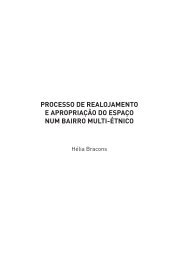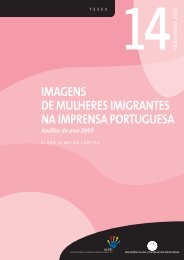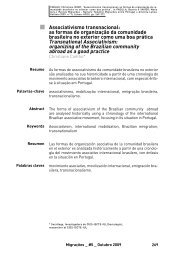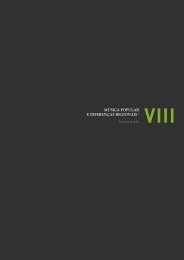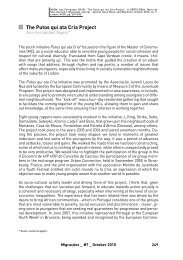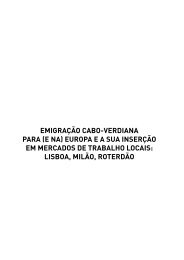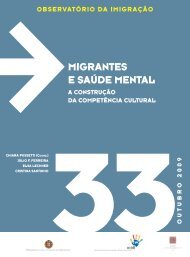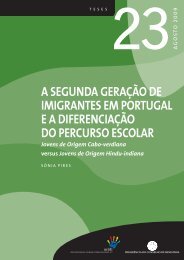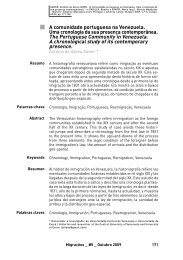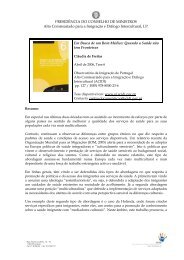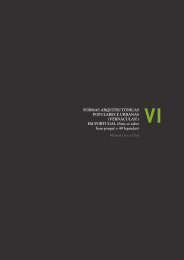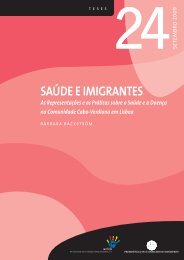Revising citizenship: migration and fado in the play of identities in ...
Revising citizenship: migration and fado in the play of identities in ...
Revising citizenship: migration and fado in the play of identities in ...
Create successful ePaper yourself
Turn your PDF publications into a flip-book with our unique Google optimized e-Paper software.
There were o<strong>the</strong>r subjects systematically avoided. Among <strong>the</strong>m were <strong>the</strong> relationshipsbetween <strong>fado</strong> <strong>and</strong> politics, ei<strong>the</strong>r on <strong>the</strong> controll<strong>in</strong>g efforts <strong>of</strong> <strong>the</strong> right w<strong>in</strong>gpast dictatorship rul<strong>in</strong>g Portugal from 1926 to 1974 or on <strong>the</strong> liberat<strong>in</strong>g actions <strong>of</strong><strong>the</strong> left w<strong>in</strong>g both before <strong>and</strong> after 1974. The major <strong>fado</strong> s<strong>in</strong>gers Amália Rodrigues<strong>and</strong> Carlos do Carmo were also, perhaps for <strong>the</strong> same reason, avoided references.The systematic avoidances were mean<strong>in</strong>gful although participants would stress thatmusic <strong>and</strong> politics were not related at all.Producers <strong>in</strong>volved <strong>in</strong> <strong>the</strong>se events, owners <strong>of</strong> restaurants, musicians <strong>and</strong> s<strong>in</strong>gers,expressed ma<strong>in</strong> motivations for <strong>fado</strong> performance: on one h<strong>and</strong>, <strong>and</strong> clearly stated,were <strong>the</strong> worries over <strong>the</strong> survival <strong>of</strong> what was expressed to be “<strong>the</strong> cultural identity<strong>of</strong> <strong>the</strong> Portuguese community” <strong>and</strong> its presentation to <strong>the</strong> foreign society <strong>in</strong> which itwas settled; on <strong>the</strong> o<strong>the</strong>r, <strong>and</strong> less overtly stated, was <strong>the</strong> <strong>in</strong>dividual hope to makesome pr<strong>of</strong>it. Nationalist propag<strong>and</strong>a pr<strong>in</strong>ciples <strong>and</strong> models that constructed <strong>the</strong> touristcategory <strong>of</strong> “traditional” Portuguese music guided <strong>the</strong>ir presentations idealizedfor American citizens or o<strong>the</strong>rs occasionally visit<strong>in</strong>g <strong>the</strong> community. The choice <strong>of</strong> <strong>the</strong>“typical” repertoire, characterized as “sad <strong>fado</strong>s that tell someth<strong>in</strong>g about <strong>the</strong> past”,<strong>the</strong> structure <strong>of</strong> <strong>the</strong> <strong>fado</strong> sessions, <strong>the</strong> content <strong>of</strong> <strong>the</strong> comments on <strong>the</strong> microphone,<strong>the</strong> d<strong>in</strong>ner menu <strong>and</strong> <strong>the</strong> formal ambience were directly imported from a model<strong>the</strong>n still present <strong>in</strong> Lisbon at some <strong>fado</strong> houses for <strong>the</strong> consumption <strong>of</strong> tourists. Theclients were, however, for <strong>the</strong> time <strong>of</strong> my fieldwork, mostly members <strong>of</strong> <strong>the</strong> migrantcommunity.The community was struggl<strong>in</strong>g to establish a local tradition able to generate l<strong>in</strong>kageswith <strong>the</strong> well succeed model <strong>the</strong>y knew from <strong>the</strong>ir pre-migrant situation. Involv<strong>in</strong>gmusic <strong>and</strong> gastronomy, it was associated with <strong>the</strong> commercial public place <strong>of</strong> <strong>the</strong>restaurant, <strong>and</strong> – as I later understood – had been shaped, ref<strong>in</strong>ed <strong>and</strong> protected by<strong>the</strong> Portuguese dictatorial cultural policy. The effort seemed well succeeded. Dur<strong>in</strong>gmy fieldwork, I heard references to <strong>the</strong> restaurant as <strong>the</strong> centre <strong>of</strong> <strong>the</strong> <strong>fado</strong> tradition,close to New York; recognized by fadistas <strong>in</strong> <strong>in</strong>troductions to <strong>fado</strong> sessions, by audiences<strong>and</strong> o<strong>the</strong>r members <strong>of</strong> <strong>the</strong> community. Flyers on local store w<strong>in</strong>dows on FerryStreet, <strong>and</strong> ads <strong>in</strong> Luso Americano 9 attested so. In <strong>fado</strong> for around 30 years <strong>in</strong> severalrestaurants <strong>in</strong> New York, New Jersey, Connecticut, Rhode Isl<strong>and</strong> <strong>and</strong> Massachusetts,a musician, guitar maker stated:“Today <strong>fado</strong> is more appreciated than some years ago here <strong>in</strong> <strong>the</strong> United States. It is becausewe are do<strong>in</strong>g this as a form <strong>of</strong> tradition. However, I should say that here (Newark) <strong>fado</strong>is more appreciated than <strong>in</strong> Rhode Isl<strong>and</strong> <strong>and</strong> <strong>in</strong> <strong>the</strong> o<strong>the</strong>r states. Most people <strong>the</strong>re comefrom <strong>the</strong> Azores. They go <strong>the</strong>re with <strong>the</strong> wives <strong>and</strong> children only for d<strong>in</strong>ner, you know! Theydon’t know how to appreciate <strong>fado</strong>. It is <strong>in</strong>different for <strong>the</strong>m to hear <strong>fado</strong> or o<strong>the</strong>r music.The real centre <strong>of</strong> <strong>fado</strong> is here.” (António Rosa, personal <strong>in</strong>terview, Newark, 24.03.1990, <strong>in</strong>Carvalho, 1991:79).The realization <strong>of</strong> <strong>the</strong> tradition, presented as a cultural obligation, was said to beessential to <strong>the</strong> identification <strong>of</strong> <strong>the</strong> group <strong>in</strong> <strong>the</strong> host society, <strong>in</strong> relation to o<strong>the</strong>rmigrant communities, <strong>and</strong> with<strong>in</strong> <strong>the</strong> community itself. 10 Informants compared <strong>the</strong>mean<strong>in</strong>g <strong>of</strong> <strong>fado</strong> to <strong>the</strong> Portuguese with that <strong>of</strong> flamenco to <strong>the</strong> Spanish <strong>and</strong> that <strong>of</strong>Migrações _ #7 _ October 201081



